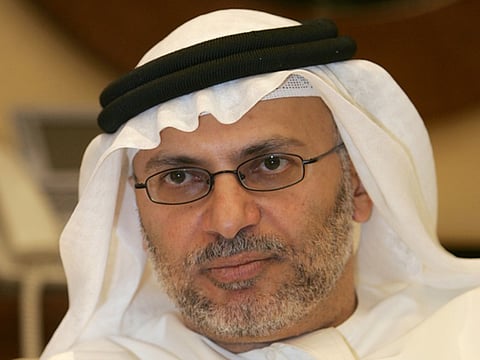Qatar moving quickly towards isolation—Gargash
UAE minister says that Qatar’s stubbornness in addressing core grievances will inflict ‘immense’ damage on its reputation

Dubai: The UAE Minister of State for Foreign Affairs, Anwar Gargash, has warned that Qatar’s stubbornness to address the core grievances of its GCC neighbours is pushing it further towards isolation.
Qatari officials have been lobbying the West by meeting with officials in Europe and appearing on Western media channels seeking to gain sympathy for its current predicament.
“This campaign of diversion has a short shelf life,” Gargash tweeted.
GCC officials have rejected Qatar’s claim that it is under “blockade” and say it is using the term to deflect responsibility of its own actions and gain sympathy in the west.
“Media and diplomacy is never a substitute for content,” he said.
“Diverting the issue of Qatar’s support of extremism in the region is not a plan. Addressing the issue of financing these groups is at the core,” he added.
Gargash reiterated the UAE stance, shared by Bahrain, Egypt and Saudi Arabia, that Qatar should stop supporting an extremist agenda in the region.
“The cost of being irresponsible is too high,” the UAE official warned, adding that damage to Qatar’s reputation would be “immense”.
Earlier in the week, Saudi Arabia’s foreign minister, Adel Al Jubeir said that the solution to the Qatar crisis lies with Doha, and any détente depends on the extent to which it responds to demands for a halt in support of extremism, interference in the internal affairs of states and incitement perpetuated by its provocative media outlets.
The Saudi diplomat said he had handed his US counterpart Secretary of State Rex Tillerson a list of names that Saudi Arabia, the UAE, Bahrain and Egypt had classified as terrorists and the US would review whether to classify them as terrorists as well.
Saudi Arabia, the UAE, Bahrain and Egypt have severed ties with Doha because of its support for terrorism, and its airspace and waters have been closed to Qatar.
Bahrain’s Foreign Minister Shaikh Khalid Bin Ahmad Al Khalifa dismissed claims on Wednesday that the decisions by Bahrain, Saudi Arabia and the United Arab Emirates to sever ties with Qatar and to close their airspace and seaports to Doha constituted a blockade.
“The measures taken are sovereign steps to protect our security and the safety of our countries,” he said, echoing similar remarks by Al Jubeir the previous day.
Lawyers define “blockade,” as the total isolation of a nation to the outside world.
UAE Minister of State for Foreign Affairs Anwar Gargash said that, by calling it a ‘blockade’, Qatar was trying to gain world sympathy and deflect attention from the core grievances against it presented by its GCC neighbours.
Meanwhile on Wednesday, US Defence Secretary Jim Mattis signed a previously-approved $12 billion warplane deal with Qatari Minister of State for Defence Affairs Khalid Al Attiyah.
A Qatari defence ministry source said the deal was for 36 jets. In November, under the administration of Barack Obama, the United States approved a possible sale of up to 72F-15QA aircraft to Qatar for $21.1 billion.
Meanwhile, Turkish Foreign Minister Mevlut Cavusoglu is expected in Kuwait on Thursday after completing a visit to Qatar, foreign ministry sources said, in his quest to help broker an end to the dispute. Kuwait has emerged as the main mediator in the crisis.
Turkey has backed Qatar in the crisis and President Tayyip Erdogan’s spokesman said on Wednesday Ankara would do all it could by diplomatic channels to prevent any escalation.
Meanwhile, the UAE envoy to Indonesia, Abdul Rahman Bin Mohammad Bin Nasser Al Owais, met with the Indonesian Minister of Foreign Affairs in Jakarta on Thursday.
Al Owais discussed the crisis in Qatar and explained that the action against it came after vigorous attempts to change the course of the Qatari national policy in the region.
He noted that the decisions taken were of sovereign nature and aimed at sending a message to the Qatari Government to change its course of undermining security and stability in the region by supporting extremism and terrorism.
He also stressed that the solution of the issue from the UAE’s point of view, of course, lies in the political path which is based on the Qatari government’s renouncing of extremism and terrorism.
Al Owais along with the Indonesian minister reviewed the list of groups and individuals classified as terrorists and those supported by the Qatari Government. He also extended appreciation to the Indonesian Government for its cooperation and understanding that extremism and terrorism threaten everyone.


